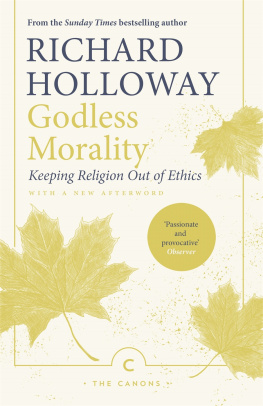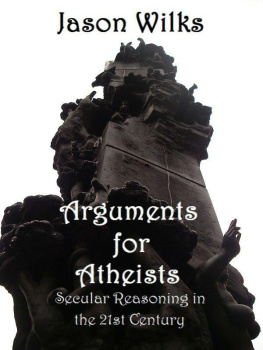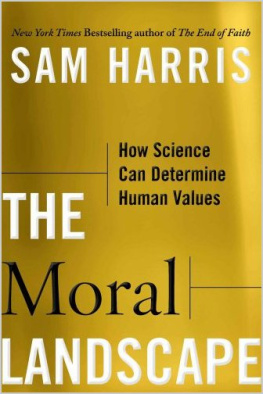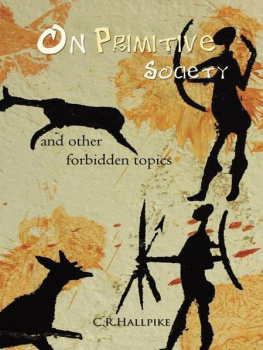I am most grateful to my daughter Julia, the Revd Canon Andrew Bowden, Prof Jonathan Good, Dr Henry Hardy, and Alison Hull for their comments and support.
C.R.H.
Foreword
The beginning point of genius is the ability to ask great questions. Sometimes an individual will ask an original question, as Einstein did when he changed the world by asking what it would be like to ride along with a ray of light. Sometimes he will apply new knowledge to an old question, as Gerald Schroeder did in The Science of God when he wondered what a day in Genesis means and used Einsteins relativity to explore it. In whatever form genius manifests itself, the common element is that the questions geniuses ask usually seem strange to other people.
Many people will find it strange that Professor Hallpike raises such an old and seemingly obvious question in this book. Christians might find the question strange because they simply accept that God is necessary for moral behavior. The problem is they seldom have the knowledge required to defend their position. Secular humanists, on the other hand, have proven themselves much better at defending their views on God and morality. They generally believe that the question has been answered in the opposite way, and even argue that a belief in God will tend to encourage people to act in reprehensible ways. This difference of opinion about the necessity of God reflects the larger social, cultural, political and intellectual schism that is dividing the Western world into factions that have largely lost the ability to communicate with each other.
We live in the age of information, but the abundance of information available to everyone has not resulted in any noticeable increase in usable knowledge about the issue of God and morality. We certainly know more about the world around us, but we still know relatively little about ourselves as human beings. That imbalance between what we know about the physical world and what we dont know about human behavior is dangerous. Western nations are losing the wisdom of tradition, but they arent replacing it with anything to help guide Mankind through its growing confusion and conflicts. It is a very peculiar age when the science to which we look to save us is failing us instead.
Modern societies suffer from a terrible combination of a modern tsunami of information, the erosion of wisdom, and the failure of the social and behavioral sciences to fill the void in understanding. This is a major reason why Christians, especially younger Christians, find themselves so susceptible to the shallow and deceptive arguments of the New Atheists. Atheists continue to repeat the argument of one of their great prophets, Karl Marx, that religion is simply a means for the weak to cope with ancient terrors and the downtrodden to come to terms with their miserable lot in life.
As a lifelong atheist who came to believe in God through science and reason, my example presents a challenging anomaly to atheists who insist that atheism is the ultimate state of Man. The examples of many other highly educated and scientifically minded Christians are an obstacle to atheists efforts to write religion off as a mere tic in the evolutionary development of the human species. However, as this volume demonstrates, far from being anomalous, my conversion from atheist to believer was fully consistent with the deep philosophical tradition on which Christianity was founded. We could never ask the question of whether we can be good without God if the dominant religious beliefs of the Western world were founded on anti-intellectualism. On the contrary, Christianity invites speculation and discussion about important issues like this.
Now, why should an astrophysicist comment on a work by an anthropologist? There are two good reasons. First, as Neugebauer pointed out, astronomy is the only ancient scientific tradition to survive the collapse of the Roman Empire intact. Astronomy represents a long, unbroken line of human inquiry into the mysteries of nature that stretches back to ancient Greece when a sea change in human intellectual development took place and the great religions of the world were emerging. Astronomy is the oldest science, while Professor Hallpikes chosen field is one of the newest. Scientists need to build bridges between the established and the emerging in order to maximize understanding.
The second and more important reason is to preserve the universal principle that binds all of the sciences together, whether it is the study of the heavens or the study of human interactions. The principle behind all of science is the search for truth guided by the unfailing commitment to go wherever the evidence leads. Scientists must always remember this true goal of science because human beings are so easily tempted and corrupted by personal, ideological, and political objectives that are inherently at odds with the search for truth.
Unfortunately, some of the sciences have been misdirected into serving the social and political goals of the secular humanist movement that has taken Europe and is on the verge of taking America. As a scientist, I recognize when science has gone off the rails of truth even if I dont know much about the scientific field. For instance, whenever I read that the science has been settled, I recognize the statement for what it truly isone of the most anti-scientific comments that could ever be made.
A few years ago, I became aware of a struggle taking place in the field of anthropology. It was reported that the American Anthropological Association leadership had decided to drop the word science from a statement about the associations long-term plan. The conflict was between professionals within the field seeking to maintain anthropology as a scientific endeavor and humanists wanting to use anthropology to make the world a better place. The executive board of the AAA tried to calm the storm by offering an amended statement of its long-term plan that included the following statement:
The Association promotes the professional interests of anthropologists, including the dissemination of anthropological knowledge among scholars and the broader public and supports the application of scientific and humanistic anthropological knowledge to improve the world in which we live.
The one vague nod to scientific knowledge does not change the fact that the AAA has abandoned the search for truth in favor of humanistic efforts to improve the world. It is an obvious truth that science cannot faithfully serve two masters. Science is the search for truth. If anthropology has a different or even a second major goal other than the search for truth, then it is no longer a true science.
Professor Hallpike demonstrates both a deep commitment to science and admirable courage in challenging the humanistic attempt to take over his discipline. Secular humanists declared long ago that God is not necessary to explain either the origins of our world or the causes of moral behavior. While research in the field of astrophysics has shown that atheists were wrong about the origins of the universe, this volume masterfully challenges humanist orthodoxy about the origins of moral behavior.

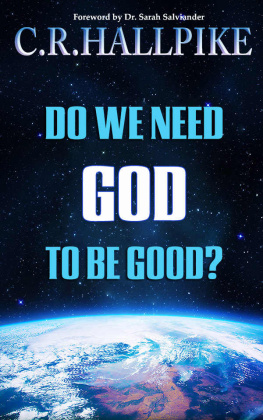
![C.R. Hallpike - On Primitive Society and other forbidden topics [notes fixed]](/uploads/posts/book/62486/thumbs/c-r-hallpike-on-primitive-society-and-other.jpg)

